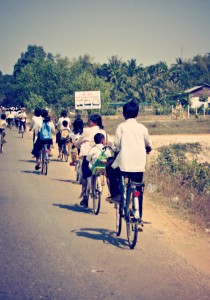
When you talk to your average non-traveler about international volunteering, it’s a given that a few things are going to come to mind: saving the animals! Providing compassionate disaster relief in areas torn asunder by tsunamis! Caring for adorable orphans! (Optional: “you know, like Angelina Jolie or whatever.”)
The reality of grassroots volunteering is, obviously, altogether different. That last image, of reading stories and cuddling sweet brown waifs in orphanages, is not only factually inaccurate, but factually troubling. There are few ideally situated children living in international orphanages … and you should probably consider, as an ethical traveler and volunteer, if you have any business working with these kids at all. Sound harsh? Read more.
Orphanages – to put it quite frankly – are the worst place for small children, and are a sub-optimal placement for kids who have already been traumatized by the loss of their parents. And in some cases these children having living relatives but are put in the orphanages for the aid and volunteer support rather than for the exemplary care. There are exceptions, but let’s look closer to home.
The United States long ago segued away from institutionalized care of dependent children, and with good reason – there are a lot of problems inherent in housing kids in these settings. Throughout the world, children in orphanages are subjected to carers untrained or unqualified to work with them, lousy living conditions, and/or a lack of policies in place to ensure that they are kept safe. The risks of physical and sexual abuse are terrifying in these environments already … and then you have random visitors and unvetted volunteers allowed to wander in off the street and interact with the kids.
Clearly, there are problems with this model.
In Cambodia, where there are many such institutions (and more opening on a continual basis), it is “in direct contravention of the guidelines and policies of the Royal Government of Cambodia. The government fully supports the Convention on the Rights of the Child, and expressly states that long-term institutionalization of children should be a last resort.” Unfortunately, orphanages are not only just not a last resort for many Cambodian children – they are used as a first resort, with no attempts to place kids with family members or find compassionate long-term foster care (both of which should only be used as a short-term answer while either reunification or a permanent, home-like setting is being established). The government is really making moves to monitor the situation more closely, but this change has only come about after a torrent of abuse claims.
Where does this leave you, oh well-meaning volunteer? At the risk of sounding harsh, it means that you probably are not qualified to volunteer at an orphanage. First of all, kids need – and deserve – continuity of care, for both their physical safety and emotional health. Orphanages that welcome day-to-day volunteers should be looked at with suspicion and any volunteer organization offering short-term visits should be looked at with suspicion as well.
It’s not that there are no well-run orphanages at all, but understand that those that are competent and caring will likely have no need for additional help. If they do, they will be looking for permanent help from local professionals. Even if volunteers are solicited or allowed, it probably won’t be in the capacity of actually caring for the children. Unless you are a trained childcare worker, social worker, or healthcare professional (and one with a strong understanding of the local language and culture, no less), you don’t really have a lot of business dropping in on these kids’ lives. What value can you really bring to them? Children aren’t there to enrich our experience abroad, and they shouldn’t be used as a photo op, day trip, or spur-of-the-moment activity. When assessing a volunteer program, look to the standards in your own home country: would this program operate under the laws built to protect vulnerable children? Often the answer is no, so you need to look at alternatives.
If you are interested in supporting kids in developing countries, do your research and find out if there is possibly a community-based program to which you could donate/support. Alternately, consider working with educational organizations and other programs through which (carefully screened, long-term) volunteers can work with children and send them back to their homes at the end of the day. If you have the long-term commitment and true love/drive/skills to get it off the ground, perhaps you could even start your own organization!
I realize this all probably sounds rather ruthless. After all, all but a microscopic minority of volunteers go into orphanages with anything but the best of intentions. On the other hand, as an American social worker, it’s hard not to get fired up over the living situations of children around the world and the environments to which they are subjected. I’ve experienced first-hand the hazards that a toxic living situation can wreak on a kid’s life, and it’s really upsetting. Not only is it saddening when children grow up with no permanent home, but the continuation of the orphanage industry only perpetuates the cycle. On top of which, conscientious and ethical volunteers will realize that what feels warm and fuzzy isn’t necessarily helpful. Effective change won’t come about until grown-ups refuse to tolerate the plight of children … and that means that, as volunteers, we need to bite back the urge to cuddle cute babies for a photo op and focus on dedicating our time and energy to areas where children are actually helped in both the short- and long-term.